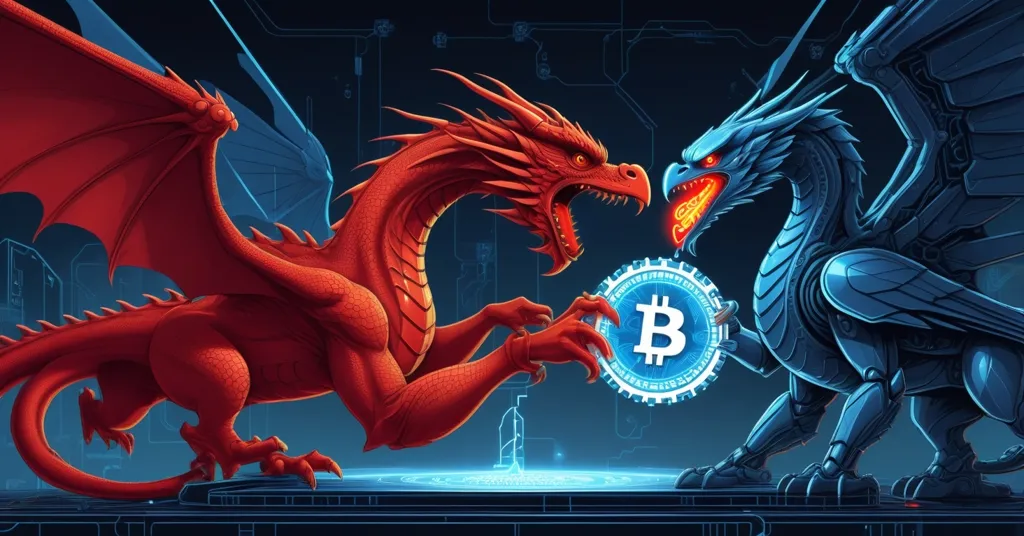China Rejects Nvidia H20 Chips: Tech War Fuels Decentralization Debate

China Slams the Door on Nvidia’s H20 Chips: A Tech War with Decentralized Stakes
China has fired a salvo in the ongoing U.S.-China tech rivalry by urging local companies to ditch Nvidia’s H20 AI chips for government and national security projects. This isn’t just a business hurdle for Nvidia and fellow American chipmaker AMD—it’s a stark reminder of how geopolitical games can throttle innovation, with implications that echo the decentralization ethos at the heart of Bitcoin and crypto.
- China’s directive discourages use of Nvidia’s H20 chips, citing security risks for sensitive projects.
- AMD’s AI accelerators face similar pushback, caught in the same protectionist net.
- Beijing boosts domestic alternatives like Huawei, despite tech gaps and supply struggles.
- The tech war underscores why decentralized systems like Bitcoin are critical in a world of centralized control.
Unpacking China’s Move: More Than Meets the Eye
Let’s get straight to the point: China’s latest guidance isn’t a mere suggestion—it’s a calculated move to sever reliance on American technology under the guise of national security. For those new to this arena, AI chips like Nvidia’s H20 are the powerhouses behind artificial intelligence applications, from training massive language models to optimizing cloud computing. They’re the beating heart of modern tech, with performance metrics like memory bandwidth—think of it as the width of a data highway—determining how fast and efficiently they handle workloads. Nvidia’s H20, designed specifically for China after U.S. export curbs blocked more advanced models, boasts top-tier bandwidth, making it a go-to for Chinese tech giants like Alibaba and Tencent. So why the cold shoulder from Beijing as reported in this recent development?
The official line is security. State media outlets like Yuyuan Tantian on CCTV have slammed the H20, claiming it poses data risks, lacks innovation, and—here’s a good one—isn’t environmentally friendly. Let’s call that last bit what it is: a laughable excuse to mask deeper motives. The real driver here is control. China has a history of sidelining foreign tech in critical sectors—think Tesla cars, Apple iPhones, and Micron chips—all under the same “security threat” banner. If it’s not made in China, it’s suspect. And with semiconductors now as vital as oil once was, Beijing’s pushing hard for tech self-reliance, even if it means settling for subpar alternatives, as detailed in this government directive on Nvidia chips.
The U.S. Side: Export Controls and Revenue Grabs
This clash didn’t ignite overnight. Since 2018, when the U.S. began targeting Chinese firms like ZTE and Huawei over espionage fears, the tech space has been a geopolitical minefield. Under the Trump administration, export bans hammered Nvidia and AMD, gutting access to a Chinese market that once fueled $17 billion—or 13%—of Nvidia’s revenue for the fiscal year ending January 2025. A sliver of relief came in mid-2025, with Washington greenlighting sales of downgraded chips like the H20, but with a sting: 15% of the revenue must be handed over to the U.S. government. It’s less a favor and more a shakedown, keeping American firms on a tight leash while still dangling a carrot in China’s direction, with further policy insights available through this discussion on H20 modifications for China.
Now, the U.S. is upping the ante with talks of embedding location tracking into high-performance AI chips to curb smuggling. Lawmakers like Representative Bill Foster and Senator Tom Cotton are championing the Chip Security Act, arguing it’s a safeguard against tech landing in hostile hands. Fair enough, but it’s also a cost spike for companies like Nvidia and a likely flashpoint with China, who’ll see it as digital overreach. Former President Trump, meanwhile, has tossed out mixed signals—calling the H20 “obsolete” while suggesting in August 2025 that a scaled-back version of Nvidia’s cutting-edge Blackwell chip could be sold to China. Make up your mind, folks. This flip-flopping only muddies the waters for companies caught in the crossfire, as explored in these U.S. policy proposals on chip tracking.
Nvidia’s Pushback: No Spyware Here
Nvidia isn’t swallowing Beijing’s narrative without a fight. The H20 was a tailored compromise—less powerful than banned models like the H100 but still leaps ahead of most domestic options, which is why firms like Alibaba, Tencent, and ByteDance can’t quit it. Facing accusations of security risks, Nvidia has been blunt in its defense, amidst ongoing debates as seen in this community discussion on the H20 ban.
“The H20 is not a military product or for government infrastructure,” the company stated. “China has never even depended on U.S. chips for government functions.”
In short, Nvidia’s saying there’s no evidence of espionage or sabotage baked into their silicon. Yet, whispers from sources like The Information paint a darker picture, suggesting China’s Cyberspace Administration (CAC) may have ordered major firms to halt purchases over data security fears. Whether this is a full-on ban or just heavy-handed nudging, it’s a brutal blow to Nvidia’s hopes of clawing back its Chinese revenue stream. And with state media amplifying every perceived flaw, the pressure’s on.
Huawei’s Moment: Underdog or Pretender?
Beijing’s counter-strategy is to prop up homegrown players, with Huawei as the poster child for domestic innovation. Since September 2024, government campaigns have pushed local chips hard, even as Huawei struggles under U.S. sanctions that block access to advanced manufacturing tools. The gap in performance is real—Biden administration estimates suggest that without Nvidia’s tech, Chinese firms face AI model training costs 3 to 6 times higher. That’s a crippling handicap. Still, there’s a twist: Nvidia CEO Jensen Huang recently noted in a Bloomberg interview that Huawei’s latest chips might rival the H200, a step above the H100. If true, that’s a seismic shift, though hard data on benchmarks remains scarce. For now, skepticism reigns—Huawei’s production can’t meet demand, let alone match Nvidia’s polish, as discussed in this comparison of Nvidia H20 versus Huawei chips.
AI researcher Lennart Heim from RAND cuts to the chase on China’s motives.
“Beijing is using regulatory uncertainty to carve out a captive market that could fully absorb Huawei’s production,” Heim observed, adding that domestic substitutes are “still not up to par.”
Translation: this isn’t just about safety—it’s about forcing Chinese firms to buy local, even if the tech’s second-rate. Investors are buying the hype, though; shares of SMIC, China’s top contract chipmaker, surged 5% after the guidance dropped, betting on a windfall for domestic players. But at what cost? If China locks out superior hardware, it risks stalling its own AI ambitions—a self-inflicted wound that could haunt its tech sector for years, with broader implications outlined in this analysis of China’s tech policy impact.
Playing Devil’s Advocate: Are Security Fears Valid?
Let’s flip the script for a moment. China’s paranoia isn’t pure fiction—foreign tech has been a vector for espionage before. The NSA’s PRISM program, exposed by Edward Snowden, proved that American companies can be roped into mass surveillance. Could Nvidia’s chips harbor backdoors for data grabs? It’s not unthinkable, though no public evidence points to this with the H20 specifically. On the other hand, China’s own history of state-backed hacking and data scandals—think TikTok controversies—doesn’t exactly make it a paragon of trust. Both sides are slinging mud, and the reality likely sits in a gray zone: security matters, but it’s also a damn convenient pretext for protectionism. Nvidia’s caught in the middle, paying the price for broader geopolitical sins, with further insights into this skepticism shared in this exploration of China’s rejection of H20 chips.
Why Crypto Enthusiasts Should Care
For Bitcoin maximalists and crypto OGs, this tech war hits a nerve, even if AI chips don’t directly touch blockchain. At its core, this is a fight over centralized control of critical infrastructure—sound familiar? Just as Bitcoin was born to disrupt state-dominated financial systems, the battle for tech autonomy mirrors our push for freedom from overreaching powers. When governments dictate who gets hardware, innovation and privacy get crushed. Imagine if blockchain gear or mining rigs faced similar clampdowns; China’s already shown its teeth with crypto mining bans under flimsy “energy” excuses. If Nvidia’s silicon is a “risk” over vague data claims, decentralized tech could easily be next on the hit list, a theme explored in this piece on decentralization and tech wars.
This is why decentralization isn’t just a buzzword—it’s survival. Bitcoin thrives because no single entity can choke its network (at least not without a hell of a fight). But as AI and blockchain converge—think AI-powered trading bots or on-chain analytics—hardware access becomes a shared vulnerability. If the U.S. or China can kneecap entire industries with policy whims, the dream of tech sovereignty feels shaky. Could open-source chip designs or decentralized manufacturing be a shield? It’s a pipe dream for now, but one worth chewing on as these giants slug it out.
Looking Ahead: A Stalemate with High Stakes
Zooming out, this isn’t merely a spat over chips—it’s the blueprint for 21st-century power struggles. Semiconductors and AI are the new battlegrounds for economic and military dominance, and neither side is blinking. Nvidia and AMD are trapped between U.S. heavy-handedness and China’s wall of protectionism. Chinese firms like Alibaba crave the best tech but are squeezed to “buy local.” Huawei might narrow the gap with state backing, but risks dragging China’s innovation down if it can’t deliver. And the U.S.? Its tracking proposals could backfire, fueling costs and resentment without guaranteed wins.
For us in the crypto space, the takeaway is brutal but clear: build systems that don’t bow to these games. Bitcoin’s resilience is our north star, but vigilance is non-negotiable as tech wars escalate. The centralized chokeholds on display here only reinforce why we champion disruption, privacy, and freedom. Let’s keep pushing for a future where no policy pen can erase our progress.
Key Questions and Takeaways
- Why is China turning away from Nvidia’s H20 AI chips?
Beijing points to national security and data risks as reasons, while strategically promoting domestic players like Huawei to cut dependence on U.S. technology. - How do U.S. export policies play into this conflict?
Initial bans devastated Nvidia’s China revenue, and even recent allowances for lower-tier chips demand a 15% revenue cut to the U.S. government, restricting market access. - Why do Chinese tech giants still favor Nvidia’s hardware?
The H20’s exceptional memory bandwidth delivers unmatched AI performance, outshining local alternatives despite political pressure to pivot. - What’s behind the U.S. push for chip location tracking?
It’s a bid to stop smuggling of advanced tech, but it risks inflating costs and stoking tensions with China over perceived digital surveillance. - How does this tech clash connect to Bitcoin and decentralization?
It exposes the dangers of centralized tech control, underscoring Bitcoin’s value as a decentralized network immune to geopolitical interference in vital systems.



